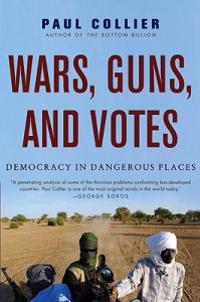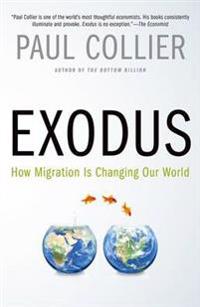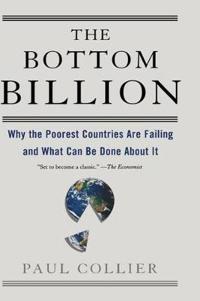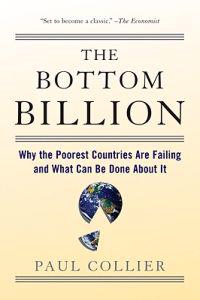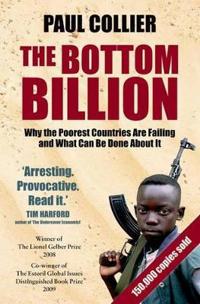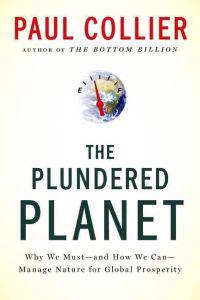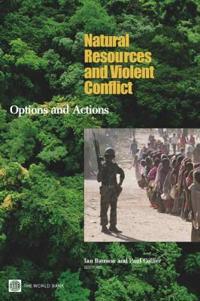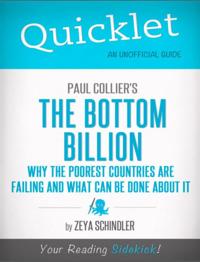Wars, Guns, and Votes: Democracy in Dangerous Places (Häftad)
avPaul Collier
ISBN: 9780061479649 - UTGIVEN: 201002In Wars, Guns, and Votes, Paul Collier investigates the violence and poverty in the small, remote countries at the lowest level of the global economy and argues that the spread of elections and peace settlements may lead to a brave new democratic world. For now and into the foreseeable future, howev[...]
Wars, Guns and Votes (Storpocket)
avPaul Collier
ISBN: 9780099523512 - UTGIVEN: 201003The world is in a mess. For more than a billion people, everyday life is played out against the backdrop of civil wars, military coups and failing economies. For them, the peaceful democracy taken for granted in the West seems an impossible pipe-dream. But solutions do exist - it is up to us to achi[...]
The Plundered Planet (Häftad)
avPaul Collier
ISBN: 9780141042145 - UTGIVEN: 201108In "The Plundered Planet: How to Reconcile Prosperity with Nature" Paul Collier proposes a radical and often counter-intuitive rethink of international policy in order to combat global poverty and environmental devastation. How can we help poorer countries become richer without harming the planet? I[...]
Exodus (Häftad)
avPaul Collier
ISBN: 9780141042169 - UTGIVEN: 2014-10Exodus is an insightful, expert foray into the explosive issue of immigration, from Paul Collier, award-winning economist and author of The Bottom Billion Mass international migration is a response to extreme global inequality, and immigration has a profound impact on the way we live. Yet our views [...]
Exodus: How Migration Is Changing Our World (Häftad)
avPaul Collier
ISBN: 9780190231484 - UTGIVEN: 2015-05It is one of the most pressing and controversial questions of our time -- vehemently debated, steeped in ideology, profoundly divisive. Who should be allowed to immigrate and who not? What are the arguments for and against limiting the numbers? We are supposedly a nation of immigrants, and yet our p[...]
Political Economy of Poverty, Equity, and Growth: Nigeria and Indonesia, The (Inbunden)
avDavid Bevan, Paul Collier, Jan Willem Gunning
ISBN: 9780195209860 - UTGIVEN: 1999-11-11The Bottom Billion: Why the Poorest Countries Are Failing and What Can Be Done about It (Inbunden)
avPaul Collier
ISBN: 9780195311457 - UTGIVEN: 200706Global poverty, economist Collier points out, is actually falling quite rapidly for about 80% of the world. The real crisis lies in a group of about 50 failing states, the bottom billion, whose problems defy traditional approaches to alleviating poverty.Here, Collier contends that these fifty failed[...]
The Bottom Billion: Why the Poorest Countries Are Failing and What Can Be Done about It (Häftad)
avPaul Collier
ISBN: 9780195373387 - UTGIVEN: 200808A leading authority on global poverty reveals what we must do to help the poorest nations on Earth
Global poverty is falling rapidly, but in around fifty failing states, the world's poorest people face a tragedy that is growing inexorably worse. This bottom billion live on le[...]The Bottom Billion (Häftad)
avPaul Collier
ISBN: 9780195374636 - UTGIVEN: 200810In this elegant and impassioned synthesis from one of the world's leading experts on Africa and poverty, economist Paul Collier writes persuasively that although nearly five billion of the world's people are beginning to climb from desperate poverty and to benefit from globalization's reach to devel[...]
The Plundered Planet: Why We Must--And How We Can--Manage Nature for Global Prosperity (Häftad)
avPaul Collier
ISBN: 9780195395242 - UTGIVEN: 201111Paul Collier's The Bottom Billion was greeted as groundbreaking when it appeared in 2007, winning the Estoril Distinguished Book Prize, the Arthur Ross Book Award, and the Lionel Gelber Prize. Now, in The Plundered Planet, Collier builds upon his renowned work on developing countries and the world's[...]
Trade Shocks in Developing Countries: Volume 1: Africa (Inbunden)
avAssociates, Paul Collier, Jan Willem Gunning
ISBN: 9780198293385 - UTGIVEN: 1999-11-18Trade Shocks in Developing Countries: Volume II: Asia and Latin America (Inbunden)
avJan Willem Gunning, Paul Collier, Associates
ISBN: 9780198294634 - UTGIVEN: 1999-11-18Conflict, Political Accountability And Aid (Pocket)
avPaul Collier
ISBN: 9780415587310 - UTGIVEN: 2010-10-08Paul Collier's contributions to development economics, and in regard to Africa in particular, have marked him out as one of the most influential commentators of recent times. This collection of his major writings provides an account of a range of macroeconomic, microeconomic and political economy to[...]
Accounting for Managers: Interpreting Accounting Information for Decision-m (Häftad)
avPaul Collier
ISBN: 9780470845028 - UTGIVEN: 2003-03-31Management Accounting Risk And Control Strategy (Spiralbunden)
avPaul Collier
ISBN: 9780750681209 - UTGIVEN: 2006-09-18Endorsed by CIMA, these cards provide coverage of several major points of the CIMA syllabus. They provide exam tips and hints; a summary of the key topics of the syllabus; visual aids to consolidate learning; and diagrams and tables to help reinforce key concepts and aid memory retention and recall.[...]
Natural Resources and Violent Conflict (Häftad)
avPaul Collier, Ian Bannon, World Bank
ISBN: 9780821355039 - UTGIVEN: 200306Explores the link between conflict and a country's economic dependence on natural resources or other primary commodities and suggests ways for the international community to help reduce the risk of conflict in developing countries.[...]
Quicklet on Paul Collier's The Bottom Billion: Why the Poorest Countries are Failing (CliffsNotes-like Book Summary)
ISBN: 9781614648598 - UTGIVEN: 2015-06ABOUT THE BOOK"e;By 2050 the development gulf will no longer be between a rich billion in the most developed countries and five billion in the developing countries; rather, it will be between the trapped billion and the rest of humankind."e;Written in 2007, Paul Collier's, The Bottom Billion[...]
Plundered Nations? (Pocket)
avPaul (EDT) Collier, Anthony J. (EDT) Venables, Paul (EDT) Collier
ISBN: 9780230290228 - UTGIVEN: 2011-09The study of natural resource extraction in resource-rich countries often shows that plunder, rather than prosperity, has become the norm. Management of natural resources differs widely in every state; a close examination of the decision making chains in various states highlights the key principles [...]
Human Virology (Pocket)
avLeslie Collier, John Oxford, Paul Kellam
ISBN: 9780199570881 - UTGIVEN: 2011-02-01Human Virology is the perfect introduction to the subject for anyone who needs to understand the general principles of viral biology, how viruses impact on human health, and how they can be managed in a clinical context.[...]
Zambia (Inbunden)
avChristopher S. (EDT) Adam, Paul (EDT) Collier, Michael (EDT) Gondwe
ISBN: 9780199660605 - UTGIVEN: 2014-11Zambia is a landlocked mineral dependent country in Southern Africa whose history is intimately entwined with the copper mining industry. Having gained Independence from Britain in 1964 at the height of a copper boom, the country experienced a slow and painful economic decline over the next quarter [...]
Management Accounting Risk And Control Strategy (Pocket)
avPaul M. Collier, Samuel Agyei-ampomah
ISBN: 9780750684972 - UTGIVEN: 2007-07-12The 2008 edition of CIMA's Official Learning Systems has been written in conjunction with the Examiner to fully reflect what could be tested in the exam.
Fully revised and now in 2 colour, paperback format the 2008 Learning Systems provide complete study material for the May and November 2008 ex[...]Fundamentals of Risk Management for Accountants and Managers (Häftad)
avPaul M. Collier
ISBN: 9780750686501 - UTGIVEN: 200903Both financial and non-financial managers with accountability for performance at either a strategic level or for a business unit have responsibility for risk management, in terms of failing to achieve organisational objectives. "Fundamentals of Enterprise Risk Management" is structured around four p[...]
Management Accounting Risk And Control Strategy (Pocket)
avPaul M. Collier, Stephen Foster
ISBN: 9780750686778 - UTGIVEN: 2008-03-10Supplementing the "Official CIMA Learning Systems and Revision Cards", this kit consolidates learning by providing an extensive bank of practice questions. Each solution provides an in depth analysis of the correct answer. It is suitable for independent study or tutored revision course, helping you [...]
Accounting For Managers: Interpreting Accounting Information for Decision M (Häftad)
avPaul M. Collier
ISBN: 9781119002949 - UTGIVEN: 2015-05-31Accounting For Managers: Interpreting Accounting Information for Decision-M (Häftad)
avPaul M. Collier
ISBN: 9781119979678 - UTGIVEN: 2012-02-29This updated and revised fourth edition of Accounting for Managers builds on the international success of the previous editions in explaining how accounting is used by non-financial managers.[...]

